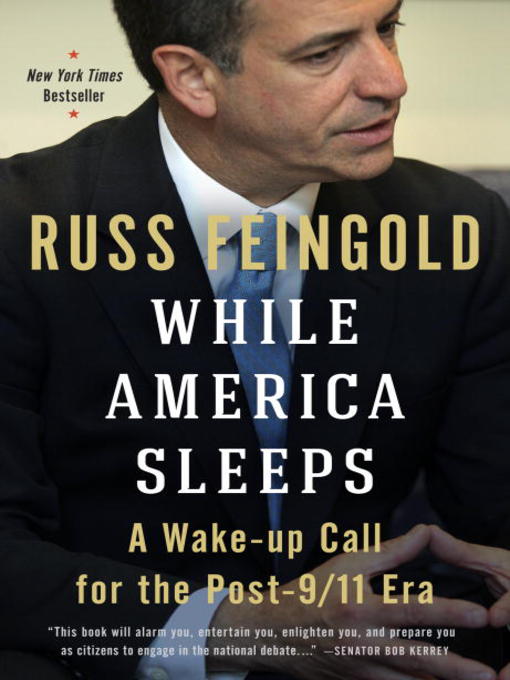
While America Sleeps
A Wake-up Call for the Post-9/11 Era
کتاب های مرتبط
- اطلاعات
- نقد و بررسی
- دیدگاه کاربران
نقد و بررسی

December 5, 2011
In this incisive political memoir, former Wisconsin senator Feingold analyzes political and military events since September 11, 2001, and provides fascinating glimpses into a senator’s daily life and decision-making process, from cloakroom wheeling and dealing and congressional delegations to Iraq, Asia, and Africa to town hall meetings and confrontations with constituents throughout Wisconsin. Citing Winston Churchill’s While England Slept, Feingold writes: “Negligent and willful oversimplification of complicated new problems, as well as a cynical exploitation of the fears generated by 9/11, have undermined our ability effectively to adjust to a new paradigm for America’s place in the world.” Feingold depicts the increasing perceptual rift between inside-the-beltway politicians and Wisconsinites, exacerbated by a Washington bunker mentality as the anthrax attacks forced senators and their staffs out of their offices and into crowded basements; the Bush administration’s machinations to invade Iraq; and Tea Partiers disrupting his Wisconsin town hall meetings to the point where other constituents stopped showing up. His shockingly reasonable and carefully considered responses, as well as his respect for, and collaboration with, such Republican colleagues as John McCain and John Ashcroft, will make progressives, Wisconsinites, and other frustrated Americans nostalgic for the days of a more thoughtful, productive Congress. Agent: Robert Barnett, Williams & Connolly.

December 15, 2011
Former Senator Feingold shares his progressive foreign-policy vision. Defeated for reelection by a Republican in 2010, the author served 18 years in the Senate, making his mark most notably with the McCain-Feingold Campaign Finance Reform Act of 2002 and by challenging the Bush administration on the Iraq War and the Patriot Act. In this straightforward, clear-eyed look at the fallout after 9/11, Feingold revisits the U.S. reaction in the wake of the attacks, which set off an "unfortunate trend" in soured international relations that is only presently being arrested under President Obama. While Feingold graciously allows former President Bush accolades for his initial words of resolve and restraint after 9/11, he grew increasingly alarmed by the hysterical fear gripping Washington, and cast the lone vote against the Patriot Act. He was disturbed by Bush's 2002 "axis of evil" speech and refused to buy the administration's justification for war, despite Joe Biden's extensive hearings and endorsement of it. (Curiously, meeting former President Nixon, his nemesis, helped Feingold come to doubt the reasoning behind the Saddam-bin Laden conspiracy.) In the post-9/11 Risk game, as he calls it, Feingold urged the government not to lose sight of other important strategic spots like Yemen, Indonesia and Somalia, and he traveled widely with Hilary Clinton and others; he first urged the troop withdrawal from Iraq in 2005 and was gratified to see it finally occurring under Obama. He has been a vocal proponent for "restoring the rule of law" to the presidency and of Obama's health-care legislation, which essentially invited the Tea Partiers to organize his defeat in the anti-incumbent fever of 2010. Sage, sensible words by a leader who can now point to how he right he was.
(COPYRIGHT (2011) KIRKUS REVIEWS/NIELSEN BUSINESS MEDIA, INC. ALL RIGHTS RESERVED.)

October 1, 2011
A former senator from Wisconsin following in the footsteps of great Midwest progressives from LaFollette to Humphrey and beyond, Feinfold offers his take on what has gone wrong in the decade after 9/11. In particular, he discusses how our whirlwind response to 9/11 has weakened both constitutional guarantees and national security. Bound to raise both cheers and hackles.
Copyright 2011 Library Journal, LLC Used with permission.

January 1, 2012
While serving as a U.S. senator from Wisconsin for nearly two decades, most notably as a member of the prestigious Foreign Relations and Intelligence Committees, Feingold, knowledgeable and influential, enjoyed an ideal vantage point from which to analyze the nation's approach to both global and domestic affairs. As a private citizen, Feingold now reflects on his tenure in office, focusing specifically on years following the attacks of 9/11, and looks ahead. He warns of a growing complacency regarding international politics and terrorism and bemoans the fact that Americans are myopically more willing to focus on the trivialities of popular culture and media-fueled controversies than matters of long-term substance. With precise recommendations in areas as diverse as citizen-advocacy programs and foreign-language education, Feingold offers a thoughtful prescription for elected officials and voters alike, and he invokes a passionate plea for every American to realize the momentous connections between ourselves and others around the world so that our nation is better able to proactively meet future challenges.(Reprinted with permission of Booklist, copyright 2012, American Library Association.)

























دیدگاه کاربران